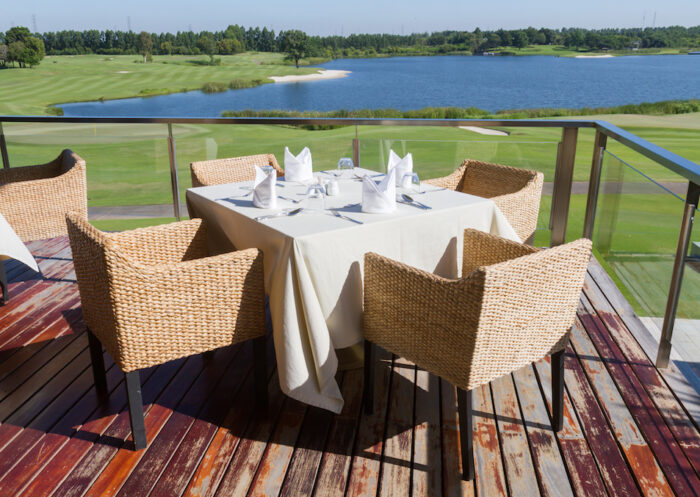“We have twice the number of vacancies but only half the number of applicants”
With Covid restrictions lifted throughout the UK and many golf clubs benefitting from an increase in usage, managers have been discovering new issues to contend with, particularly a bar and restaurant staffing crisis. Industry expert Steven Brown analyses how this happened and details what golf clubs can do about it.
As if golf clubs haven’t suffered enough already with the effects of Covid and all the ensuing restrictions on trading, a new epidemic has now surfaced, and it has every chance of having a similar major impact on the industry.
It is the nationwide shortage of staff that is badly affecting golf clubs’ ability to trade properly.
I spoke recently to the former club development manager of Scottish Golf, Kevin Fish, who now runs a recruitment company. He said: “I have twice the number of vacancies I’ve ever had and only half the number of applicants!”
What has caused this problem and, more importantly, what is the solution?
Covid has been a life changer for all of us and indeed our leisure industry. The trading restrictions it placed upon us, together with the opportunity to furlough staff for long periods of time or to reduce our headcount by means of natural wastage or redundancies, has led to a sea change in our relationships with staff.
A large number of my clients have subsequently reported that they are now struggling to regenerate staff’s interest in returning to work for them. Is this due to a national malaise and lethargy on the staff’s part?
Is this due to them finding alternative employment elsewhere?
Is it due to long term Covid issues and concerns of exposure if returning to work?
The answer to that is yes to all of them to a greater or lesser degree.
Surely the key questions should be, could these issues have been avoided and how can we redress the balance and ensure that they never occur again?
For those of you that know me, and can recall previous articles I have penned, you may well recall my clarion call over the years for F&B units to stop employing people from the neck down as a pair of hands, or those that are warm to the touch or have breath on the mirror, those who will work for minimum rates, or are simply available NOW. You didn’t get employed on that criteria so why do we use it as the yardstick when taking on F&B staff to be the face of our units?

This was never the correct approach to staff recruitment and now it has come back to bite the industry in the posterior.
I fully understand the need for a “pair of hands” during the forthcoming busy summer periods and that will probably never change, but not to invest in any way in these people with an excellent support package is a short-sighted approach in my view.
These very people may be that extra pair of hands you need to get you through those stressful times but there are undoubtedly some little gems among who that may be seeking a career in food and beverage and not just a ‘pocket money opportunity’, and I just wonder what message we are sending them during the time they spend with us.
Where then is your succession plan, designed to identify and recruit these people? What inducement is there for them to enter the industry on a full-time basis?
Remember, you have these people on a trial basis for a short time in which to make an assessment as to their potential, so please don’t waste it.
Do you have a training and development structure in place that will assist them both in the short term that they will be with you and beyond, that could lead to them becoming your future head chef, head of bars or even your food and beverage and events manager?
Let me return to the subject of the apparent malaise amongst F&B workers who, due to Covid, have suddenly found themselves with time on their hands and money in their pockets. Did they suddenly become attracted to not having to work unsociable hours, pressures from members or a continual interference with their social lives? A number of my clients have reported as much to me and I have no reason to not believe that some staff members have taken this course of action.
Added to this, many of these people have now left the industry to find different job opportunities. I have been told: “My bar person is now working at Aldi for £2 per hour more than I was paying them, with no weekend work, no locking up at 11pm on their own and absolutely no pressure.”

We have, as an industry, two key issues: How do we keep the good staff we have? How do we attract good staff?
Over the past 12 months, and in previous articles, I have been expanding my theory that whilst Covid has a great deal to answer for, it should have allowed, in quieter trading times, the opportunity for clubs to reassess their F&B operations and to decide which is the best trading model for them going forward.
This situation was exacerbated by a large number of franchisees opting out of their agreement with clubs, due, understandably, to the fact that they were not trading and generating income. The downside was that catering (and bar) operations were suddenly handed back to clubs and with nobody in place to manage and control the units.
Many clubs are now responding to this challenge either by finding a new franchisee or indeed by taking the service in-house, and that of course means staffing it – but hopefully not with people who are just available and warm to the touch!
That approach simply will not work. If faced with this challenge, you need to adopt a structured, tried and tested approach which may mean in the short term that you have to employ the services of expensive agency staff.
Not ideal I grant you, but it beats the hell out of golf club secretaries / managers and their office staff pulling pints and cooking a full English breakfast because they are the only ‘pairs of hands’ available at the club to provide a service to the members. That is not the best use of their time.
My entire consultancy time currently is spent in helping clubs to establish a professional approach to setting up and controlling a catering operation when they have never done it before. Mow, I can do that, but not without professional staff I can’t.
Where are we going to find these people and how will you attract them?
The method of recruiting staff doesn’t change. Advertising through any of the many media sites, promoting from within, head hunting, catering colleges, recruitment agencies and so on.
In some sense that’s the easy part. The key has to be, what you are offering prospective employees, and this is true now more than ever before.

I recently conducted a conference on this subject on behalf of the CMAE. During it, Anette Whitteley outlined the position in the USA while I made the case for the UK and Europe.
What was surprising to me initially was that the USA is in a similar staff shortage position as we are, but what was really surprising was how they are tackling the problem.
It became immediately apparent that in the F&B business in the USA, at every stage of recruitment and employment, their organisations are investing in people. Here are some examples she gave:
• Paying for on job training
• Paying for day release training with lifelong learning
• Reducing the number of hours worked for no reduction in pay
• Bonus payments for exceeding challenging targets
• Stress related support packages
• Improved health care support packages
• Additional paid days off
• Increased hourly rates for improved performances
• Career opportunities through succession planning
• Regular team meetings, updates and outings
• Recognition and inclusion in the decision-making process
• The opportunity to experiment without a search for the guilty.
Now, there will be those among you reading this who will attest to the fact that they are providing many of these things already and I will firstly thank you, and secondly reassure you that you will be suffering the staff crisis issue a lot less than the clubs that have done nothing!
There is no doubt that the staffing shortage is causing major problems. Recent research shows that high street F&B venues have responded to the problem in the following way: 76 percent are now paying higher than normal wages and in some cases a lot higher, 36 percent are reducing opening hours due to no staff being available and 36 percent are increasing the benefits package they offer.
I am aware that a number of my clients have similarly adopted some or all of these options. So how will you, if you adopt the policy of paying higher wages, pay for it if you cannot afford it?
Should you decide to try to cover the increases, your options are to:
1. Increase your members’ annual fees and green fees
2. Reduce the amount of discount you give to members for F&B products
3. Increase the retail prices of food and beverage
4. Use up the club’s reserves to cover pay rises
5. Negotiate better wholesale deals
6. Reintroduce joining fees from new members to subsidise the increased payments.
All of the above are legitimate means of financing increased pay rates. Some will be strongly resisted and some are not particularly desirable, but one thing is for certain, if you decide to improve the pay rates you offer then someone, somewhere, has to pay for it.
Nobody wants to reduce any of the benefits that members receive but they will be the first to complain, and trade will suffer, if they have to wait 15 minutes to get served and 30 minutes for their food if there are no staff to take orders and to serve it.
A London-based client has increased their offer for a chef by more than £15k above the norm. A West Country club, seeking an F&B manager, has offered £10k more than the usual rate simply to generate interest. I am told that the people that are applying are clearly inexperienced and not necessarily of the calibre required.

Perhaps the offer is not right. Perhaps the offer does not reflect the needs of today’s employees. Perhaps the image we are promoting does not match their aspirations.
Food and beverage, as an industry, has a lot going for it, but perhaps it’s now time for a fundamental rethink! Not just for the golfing industry but for F&B outlets in general.
We need to adopt the ethic used so well by John Lewis and Marks & Spencer, who invest in their workforce and seemingly have little difficulty in attracting the right people to work for them and in retaining them.
These people do not work for these organisations just because they are nice to work for, they work for them because they are cared for, respected, listened to and valued.
They are supported through training. Their mental welfare is protected and their input valued.
What’s stopping us doing something similar? Is it all about money? How much money did you budget for last year to spend on training and how much of that did you actually spend?
A wise man once said: “What happens if you train your staff and they leave? But what happens if you don’t train them and they stay?” Invest in people, don’t simply employ them.
We are facing an unprecedented challenge to our golf clubs’ F&B businesses. The green shoots are beginning to show again. Corporate and event business is coming back. Visiting societies are emerging from the darkness, and the day-to-day business will, if handled properly, return. This will not happen overnight but that simply gives clubs the opportunity to tackle their staffing issues now in readiness for that growth.
I have a number of clients that are ahead of the game right now and are reaping the benefits. They recognised that retaining quality staff meant an increased wage percentage and that this far outweighs the cost of finding and recruiting new staff.
Steven Brown FBIIt.p. is supreme commander of Inn-Formation and can be contacted on 07785 276320 or emailed on herinn@aol.com















Thanks for posting Steven. Interesting article.